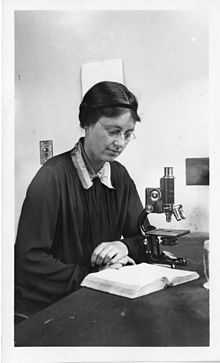Kathleen Mary Drew-Baker

Kathleen Mary Drew-Baker (1901–1957) was a British phycologist, born in Leigh, Lancashire, particularly known for her basic research on the edible seaweed Porphyra laciniata (nori), which led to a breakthrough for commercial growing.
Kathleen Drew-Baker studied the life cycle of the red alga Porphyra umbilicalis and found out that the microscopic Conchocelis—hitherto thought of as an independent alga—was the diploid stage of the same organism that Porphyra is the macroscopic, haploid stage of.[1] Her investigations were soon repeated by the Japanese phycologist Sokichi Segawa, who in turn provided knowledge to revolutionize Japanese nori culture, which before had suffered from unpredictable harvests. Already by 1953, Fusao Ota and other Japanese marine biologists had developed artificial seeding techniques, building on her work. This in turn increased production and led to a boost in Japanese seaweed industry.
Kathleen Drew-Baker is still today hailed as the Mother of the Sea in Japan.[2] Her work is celebrated each year on April 14.
Kathleen Drew-Baker spent most of her academic life at the cryptogamic botany department of the University of Manchester, serving as a Lecturer in Botany and Researcher from 1922 to 1957. She also spent two years working at the University of California. She was a co-founder of the British Phycological Society and its first President.
References
- ↑ Drew, Kathleen M. (1949). "Conchocelis-phase in the life-history of Porphyra umbilicalis (L.) Kütz". Nature 164 (4174): 748–749. doi:10.1038/164748a0.
- ↑ "Titanic musician and palace intruder enter dictionary". BBC News. 2010-05-27. Retrieved 27 May 2010.
- ↑ "Author Query for 'K.M.Drew'". International Plant Names Index.